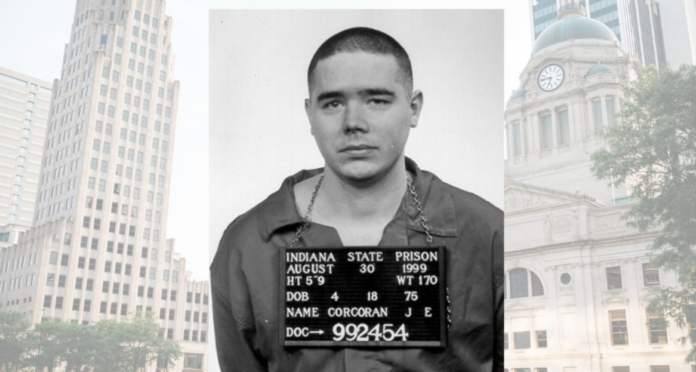
By Niki Kelly
Indiana Capital Chronicle
The Indiana Supreme Court on Wednesday set a Dec. 18 execution date for a Fort Wayne quadruple murderer, but said he has other legal options to try to block the resumption of the death penalty in Indiana.
Joseph Corcoran’s attorneys have argued that he should not be executed because he is “unquestionably seriously mentally ill,” and that killing him would violate the Eighth Amendment to the U.S. Constitution as cruel and unusual punishment.
Corcoran’s mental health has been a part of the decades-old case since its inception, with state and federal public defenders saying he continues to suffer from paranoid schizophrenia that causes him to experience “persistent hallucinations and delusions.”
In a 5-0 decision, the court said it could consider previously undiscovered evidence but not past evidence of mental illness.
In 1999, a jury unanimously found Corcoran guilty of four counts of murder for killing his brother, James Corcoran; his sister’s fiancé, Robert Scott Turner; and their two friends, Timothy Bricker and Douglas Stillwell. The jury recommended a death sentence, and that’s what the Allen Superior Court imposed.
Corcoran’s sentence has been upheld multiple times by state and federal courts.
The court said Corcoran does have other options, including raising claims of newly discovered evidence; filing a successive petition for post-conviction relief or filing a civil lawsuit to challenge the execution protocol.
But, until then, the court said, “the only issue properly before us is our administrative task” — to set an execution date.
That’s Dec. 18, before the hour of sunrise.
Indiana’s last execution was in 2009. Since then, the state has effectively been forced to pause the death penalty. Increased scrutiny of lethal injection drugs led pharmaceutical companies to refuse to sell their products for use in executions.
It wasn’t until June that Gov. Eric Holcomb, along with Indiana Attorney General Todd Rokita, announced that the state’s Department of Correction has obtained pentobarbital to carry out the death penalty.
It is unclear how the state obtained the pentobarbital. The governor’s office has declined to say where the drug was acquired, citing state law. Lawmakers made information about the source of the drugs confidential on the last day of the 2017 legislative session.
The Indiana Capital Chronicle filed a records request June 30 seeking the cost of the drugs.
The Indiana Department of Correction replied that it was “currently evaluating what, if any, information regarding its lawful procurement of the lethal chemical pentobarbital it may disclose without contravening Indiana law, including but not limited to the information that forms the basis for your request.”
In response to a status request on Aug. 16, the agency said it is “managing dozens of requests for information about its execution procedures” and is “unable to provide you with a specific timeframe for processing your request.”
The one-drug method is a departure from the state’s protocol used since 1995, involving a series of three chemicals.
Although no state-level executions in Indiana have used pentobarbital before, 13 federal executions carried out at the Federal Correctional Complex in Terre Haute have been carried out with the drug. Fourteen states have used pentobarbital in executions, too.
* * *
The Indiana Capital Chronicle is an independent, nonprofit news organization dedicated to giving Hoosiers a comprehensive look inside state government, policy and elections. The site combines daily coverage with in-depth scrutiny, political awareness and insightful commentary.




